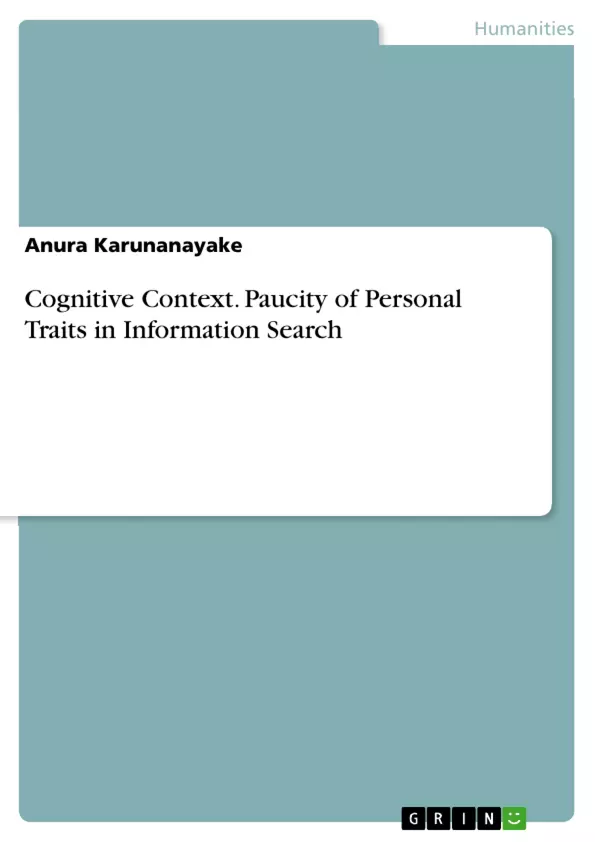This book continues a line of research developed in three previous studies. The first study in the series, by Karunanayake & Nagata examined some affected variables of information need occurrence of an information seeker and developed a comprehensive hypothetical model. The second study, by Karunanayake & Nagata, looked at influences of personal traits (combination of both cognitive and psychological context as a whole) in the process of information searching. The results of the third study are limited to the two personal traits and excluded psychological traits. Hence, this book is a continuing result of the previous three research studies.
With the rapid development of information systems, libraries try to provide wider information opportunities for the users through ever-growing innovative services and informative resources. Contemporary, academic programs and the method of teaching in universities, as well as the choice of information of students, are also being changed. Though there are wider learning opportunities at a glance, it is uncertain whether the students are achieving the required learning outcome through their process of seeking information from libraries. Therefore, it is imperative to comprehend whether and how library users obtain comfortable experiences or difficulties in library use when designing library systems. Study of users’ behavior directed towards the cognitive context is analyzed and explained by this study. Analyzing the cognitive context of library users is vital to understand how libraries are being used and what kinds of patterns they constitute. Hence, this study tries to explain students’ library use in the process of information searching and obtaining to understand their core efforts, and identifying patterns of library use.
At the set out this study reviewed two kinds of forerunners’ researches. The first is an examination of arguments about the process of information search. Theories which argued on crucial points of searching behaviors of people with regard to their knowledge, skill, and others psychological elements, namely Gaps of knowledge (Allen), Uncertainty (Kuhlthau), Gaps through sense making process (Dervin), and Anomaly status (Belkin), were examined. Secondly, the recent researches on pattern development of students’ library use, in general, were also reviewed.
Inhaltsverzeichnis (Table of Contents)
- COGNITION-PERSONAL TRAITS-INFORMATION SEARCH
- Overview
- Cognition as an Issue of Information Search Process
- Why Cognitive Context is Important?
- Socio Environment (External factors)
- Cognitive Environment or Personal Traits (Internal factors)
- Does Cognition or Personal Traits Create Differences in Information Search?
- Summary
- References
- PREDECESSORS' VIEWS
- Introduction
- Some Variables Affecting Students' Behavioural Differences in Library
- A Closer Look at the Effects of Cognition in Library Use
- Library Use Patterns of Undergraduates and Others
- Use Patterns from Discipline Context
- Library Use Patterns from the Context of Academic Years
- Use Patterns from Cognitive Context
- Why Need to Look at Information Search from the Cognitive Context?
- Summary
- References
Zielsetzung und Themenschwerpunkte (Objectives and Key Themes)
This book examines the role of cognitive context, specifically knowledge and skill, in students' information search behavior within libraries. It builds upon previous research by the author, investigating the influence of personal traits on information seeking processes. The study aims to understand how students' cognitive abilities and skills shape their library use patterns and identify specific groups of students with distinct information search behaviors.
- The impact of cognitive context on information search behavior
- Identifying and analyzing patterns of library use among students
- The influence of knowledge and skill on students' search strategies and resource selection
- The development of library services that cater to diverse cognitive needs and skills
- The importance of understanding students' information search patterns for effective library design and service provision
Zusammenfassung der Kapitel (Chapter Summaries)
The first chapter provides an overview of the research topic, focusing on the importance of cognitive context in information search processes. It examines the influence of both external and internal factors on information seeking behaviors. The second chapter explores previous research on information search and library use patterns among students. This chapter examines the influence of various factors, including discipline, academic year, and cognitive context, on students' library utilization.
Schlüsselwörter (Keywords)
This book focuses on the cognitive context of information search, specifically examining the role of knowledge and skill in students' library use patterns. The primary themes include information search behavior, library use patterns, cognitive context, knowledge, skill, and student information needs. This research aims to understand how these factors influence students' interactions with library resources and services.
Frequently Asked Questions
What is "Cognitive Context" in information searching?
Cognitive context refers to the internal personal traits of an information seeker, specifically their existing knowledge, skills, and mental state, which influence how they search for and process information.
How does student behavior in libraries differ based on cognition?
Students with different levels of knowledge and skill exhibit distinct patterns in how they select resources, use library systems, and experience difficulties or comfort during the search process.
What are the "Gaps of Knowledge" mentioned in the book?
The study reviews theories from researchers like Allen, Kuhlthau, and Belkin, who argue that searching behavior is driven by an awareness of uncertainty or an "anomaly" in one's knowledge state.
Why is it important for libraries to understand cognitive context?
Understanding these patterns is vital for designing effective library systems and services that cater to the diverse needs and learning outcomes of university students.
Does the academic year influence library use patterns?
Yes, the research explores how library use patterns evolve as students progress through different academic years and disciplines, influenced by their growing cognitive environment.
- Citation du texte
- Anura Karunanayake (Auteur), 2016, Cognitive Context. Paucity of Personal Traits in Information Search, Munich, GRIN Verlag, https://www.grin.com/document/324074



